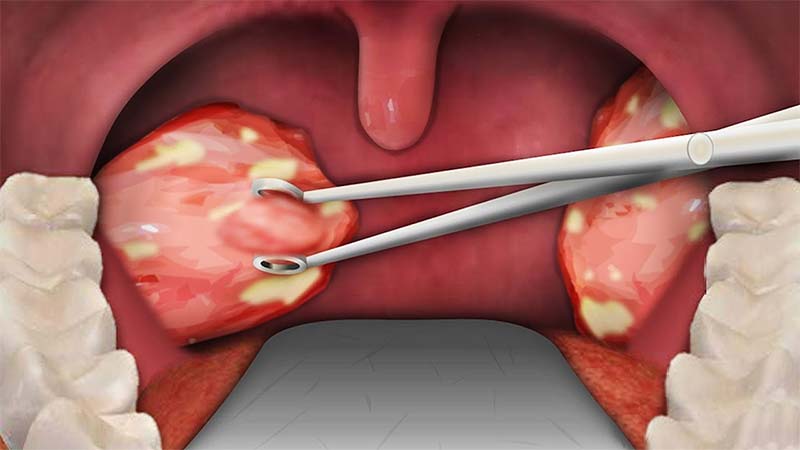Tonsillectomy and adenoidectomy are surgical procedures performed to remove the tonsils and adenoids.
The tonsils are a pair of lymph organs that sit in the back of the mouth. While these structures do play a minor role in the immune system, their removal does not impact a patient's ability to heal or fight infection. The tonsils typically grow throughout early childhood reaching their peak size at around ages 9 to 11. After this they tend to involutes somewhat, although the occasional teenager or adult will still have enlarged tonsils.
The first report of tonsillectomy was made by the Roman surgeon Celsus in 30 AD when he described removal of the tonsils with a scalpel for infection. Currently, while some surgeons still use the traditional scalpel for tonsillectomy, due to considerations of postoperative pain and bleeding many other treatment strategies including electocautery and coblation have gained wide popularity. Although due to more stringent surgery criteria the number of tonsillectomies performed in the United States has declined since the 1950's and 1960's, tonsillectomy remains one of the most common procedures in the United States. Most tonsillectomies are performed in children although some are done on adolescents and adults.
The most common reason that tonsillectomy is performed in the United States is for sleep apnea. This is when tonsils get large enough that they cause blockage of the upper airway and cause snoring and disruptions in breathing or actually cause someone to stop breathing occasionally. In time, sleep apnea can in time lead to cardiopulmonary problems, neurologic disorders and failure to thrive (or problems growing). Apnea more immediately can cause behavior problems at school and make the child appear either hyperactive or chronically fatigued and can also be the cause for continued or reappearance of bed wetting (for more about sleep apnea and its signs and symptoms click here).
Other reasons to have your tonsils removed include recurrent tonsillar abscesses, tonsillitis leading to febrile seizures, multiple recurrent infections, persistent and frequent bad breath from chronic tonsillitis, chronic tonsil stones or debris or a suspected tonsillar tumor.
It is generally true that adults have a more difficult time with undergoing tonsillectomy than do children. Although most tonsillectomies are performed as an outpatient or with a single overnight stay, the average recovery time from tonsillectomy is usually about two weeks for adults or one week for children. For the first two weeks we also recommend a soft diet which generally means avoiding things with sharp edges such as chips or pretzels etc. Patients may also want to avoid citrus fruits as this can irritate the tonsil beds. It is important to keep hydrated during the post-operative period as this can lead to a cycle of increased pain decreased fluid intake. If the patient does have significant problems with dehydration it is important to notify your doctor so it can be treated.
The risk of complications from tonsillectomy is relatively low, the most common of which is a small risk of bleeding (around 2-5 percent of patients). The risk of bleeding is slightly higher in adults. The most common time for this to occur is approximately 5 to 10 days after surgery. If you notice blood from the mouth you should notify your doctor immediately. Most of the time this type of bleeding is mild and can be managed with ice-water gargles and/or chemical cautery, but occasionally this needs to be controlled in the operating room.
Often patients, especially children will have concurrent adenoid enlargement and occasionally recurrent ear infections, requiring the combination of tonsillectomy with one or both of these procedures. For more information on ear tubes click here, and for more information about adenoidectomy click here.
If you have further questions about tonsillectomy, or think you or your child may be a candidate please don't hesitate to give us a call.
Tonsillectomy recovery is painful for children and usually even worse for adults. Adults should plan on missing up to two weeks of work, and children, about one week of school. During your tonsillectomy recovery, care should be taken to avoid strenuous activity as it may increase pain and can also increase the risk of bleeding.
Here are a few tonsillectomy recovery tips that can help you have a smoother recovery after your tonsillectomy
